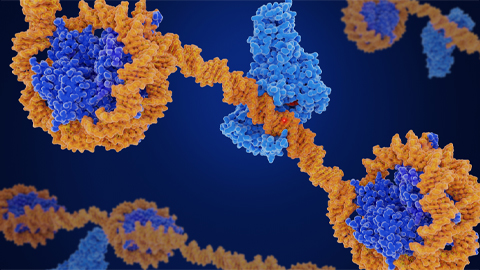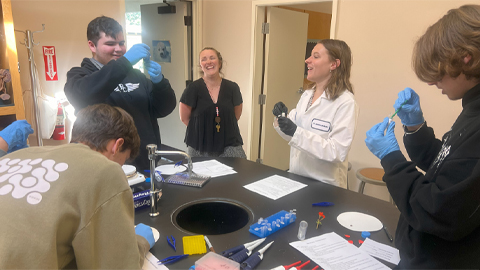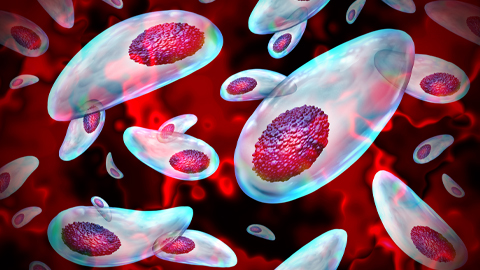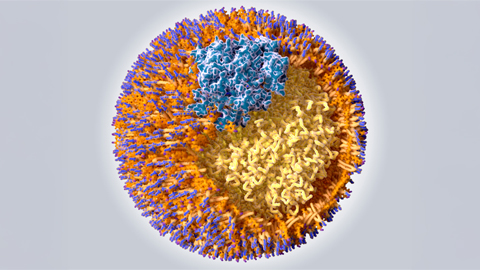Your genetics influence how resilient you are to cold temperatures – new research
Some people just aren't bothered by the cold, no matter how low the temperature dips. And the reason for this may be in a person's genes. Our new research shows that a common genetic variant in the skeletal muscle gene, ACTN3, makes people more resilient to cold temperatures.

when exposed to cold water.
Around one in five people lack a muscle protein called alpha-actinin-3 due to a single genetic change in the ACTN3 gene. The absence of alpha-actinin-3 became more common as some modern humans migrated out of Africa and into the colder climates of Europe and Asia. The reasons for this increase have remained unknown until now.
Our recent study, conducted alongside researchers from Lithuania, Sweden and Australia, suggests that if you're alpha-actinin-3 deficient, then your body can maintain a higher core temperature and you shiver less when exposed to cold, compared with those who have alpha-actinin-3.
We looked at 42 men aged 18 to 40 years from Kaunas in southern Lithuania and exposed them to cold water (14℃) for a maximum of 120 minutes, or until their core body temperature reached 35.5℃. We broke their exposure up into 20-minute periods in the cold with ten-minute breaks at room temperature. We then separated participants into two groups based on their ACTN3 genotype (whether or not they had the alpha-actinin-3 protein).
While only 30% of participants with the alpha-actinin-3 protein reached the full 120 minutes of cold exposure, 69% of those that were alpha-actinin-3 deficient completed the full cold-water exposure time. We also assessed the amount of shivering during cold exposure periods, which told us that those without alpha-actinin-3 shiver less than those who have alpha-actinin-3.
Our study suggests that genetic changes caused by the loss of alpha-actinin-3 in our skeletal muscle affect how well we can tolerate cold temperatures, with those that are alpha-actinin-3 deficient better able to maintain their body temperature and conserve their energy by shivering less during cold exposure. However, future research will need to investigate whether similar results would be seen in women.

ACTN3's role
Skeletal muscles are made up of two types of muscle fibres: fast and slow. Alpha-actinin-3 is predominantly found in fast muscle fibres. These fibres are responsible for the rapid and forceful contractions used during sprinting, but typically fatigue quickly and are prone to injury. Slow muscle fibres on the other hand generate less force but are resistant to fatigue. These are primarily the muscle you'd use during endurance events, like marathon running.
Our previous work has shown that ACTN3 variants play an important role in our muscle's ability to generate strength. We showed that the loss of alpha-actinin-3 is detrimental to sprint performance in athletes and the general population, but may benefit muscle endurance.
This is because the loss of alpha-actinin-3 causes the muscle to behave more like a slower muscle fibre. This means that alpha-actinin-3 deficient muscles are weaker but recover more quickly from fatigue. But while this is detrimental to sprint performance, it may be beneficial during more endurance events. This improvement in endurance muscle capacity could also influence our response to cold.
While alpha-actinin-3 deficiency does not cause muscle disease, it does influence how our muscle functions. Our study shows that ACTN3 is more than just the "gene for speed", but that its loss improves our muscle's ability to generate heat and reduces the need to shiver when exposed to cold. This improvement in muscle function would conserve energy and ultimately increase survival in cold temperatures, which we think is a key reason why we see an increase in alpha-actinin-3 deficient people today, as this would have helped modern humans better tolerate cooler climates as they migrated out of Africa.
The goal of our research is to improve our understanding of how our genetics influence how our muscle works. This will allow us to develop better treatments for those who suffer from muscle diseases, like Duchenne muscular dystrophy, as well as more common conditions, such as obesity and type 2 diabetes. A better understanding of how variants in alpha-actinin-3 influences these conditions will give us better ways to treat and prevent these conditions in the future.
This article is republished from The Conversation. Read the original here.
Enjoy reading ASBMB Today?
Become a member to receive the print edition four times a year and the digital edition monthly.
Learn moreGet the latest from ASBMB Today
Enter your email address, and we’ll send you a weekly email with recent articles, interviews and more.
Latest in Science
Science highlights or most popular articles

CRISPR epigenome editor offers potential gene therapies
Scientists from the University of California, Berkeley, created a system to modify the methylation patterns in neurons. They presented their findings at ASBMB 2025.

Finding a symphony among complex molecules
MOSAIC scholar Stanna Dorn uses total synthesis to recreate rare bacterial natural products with potential therapeutic applications.

E-cigarettes drive irreversible lung damage via free radicals
E-cigarettes are often thought to be safer because they lack many of the carcinogens found in tobacco cigarettes. However, scientists recently found that exposure to e-cigarette vapor can cause severe, irreversible lung damage.

Using DNA barcodes to capture local biodiversity
Undergraduate at the University of California, Santa Barbara, leads citizen science initiative to engage the public in DNA barcoding to catalog local biodiversity, fostering community involvement in science.

Targeting Toxoplasma parasites and their protein accomplices
Researchers identify that a Toxoplasma gondii enzyme drives parasite's survival. Read more about this recent study from the Journal of Lipid Research.

Scavenger protein receptor aids the transport of lipoproteins
Scientists elucidated how two major splice variants of scavenger receptors affect cellular localization in endothelial cells. Read more about this recent study from the Journal of Lipid Research.


